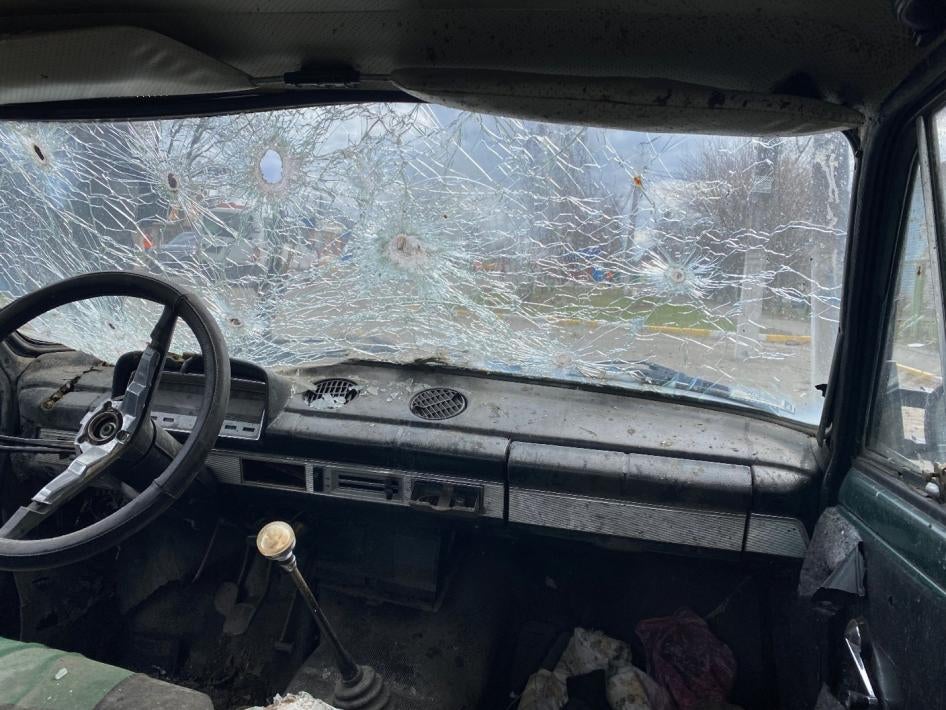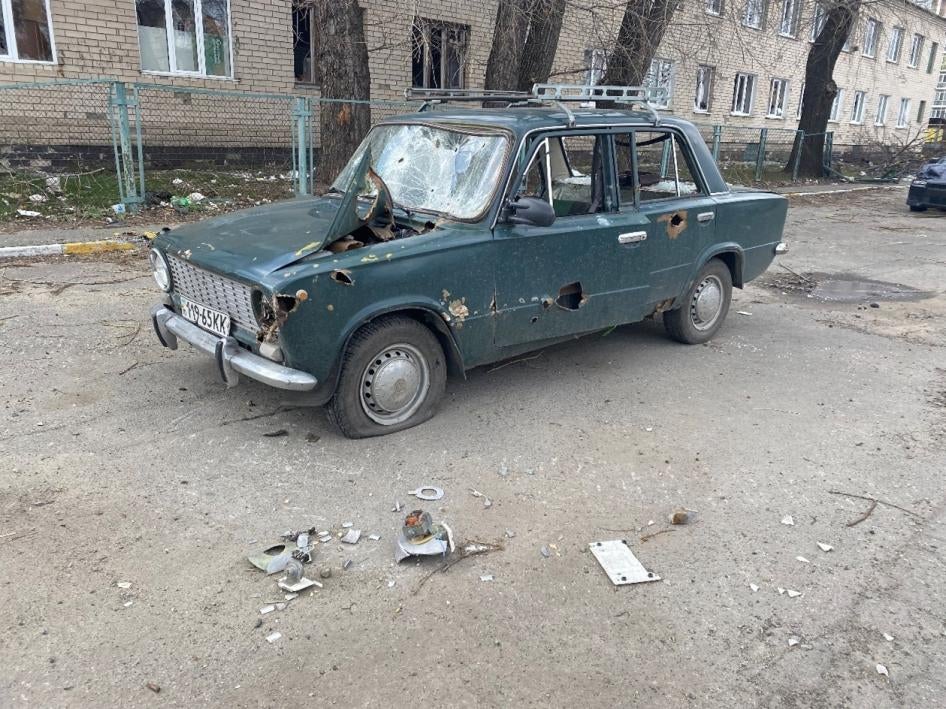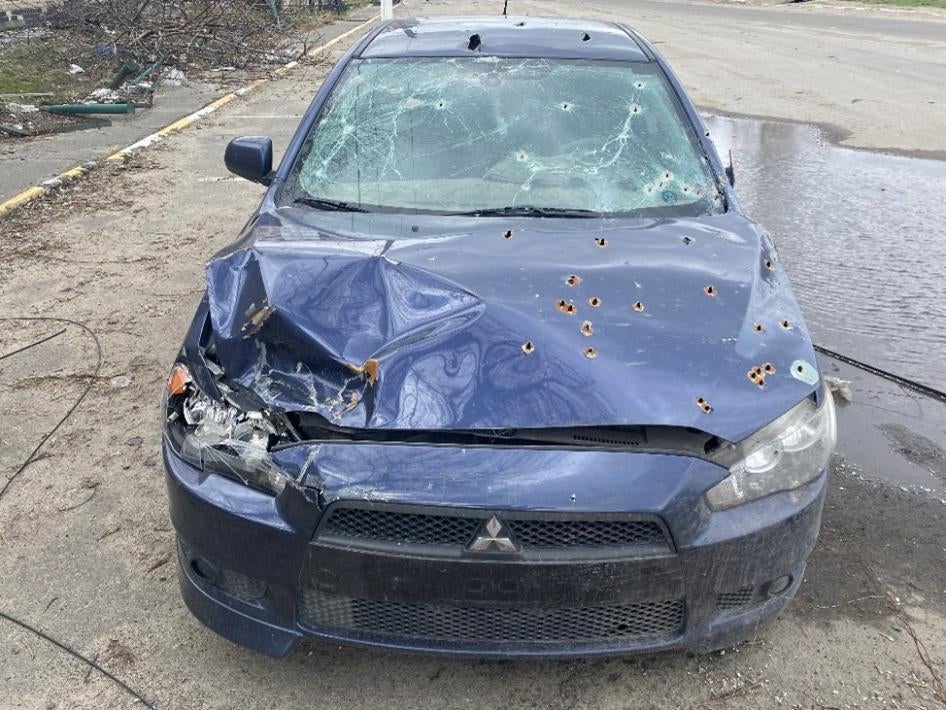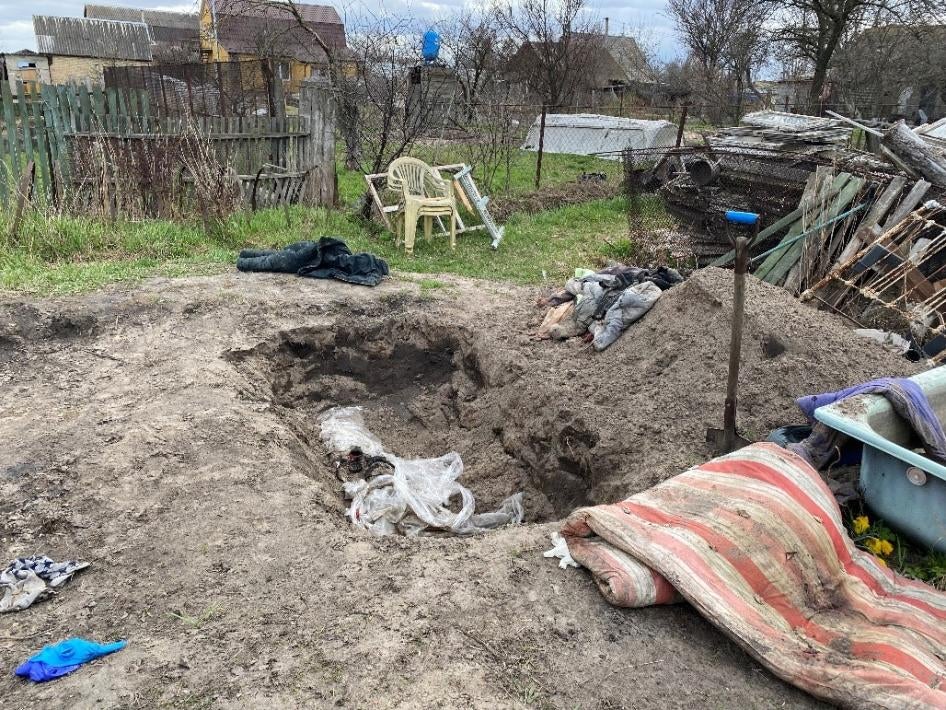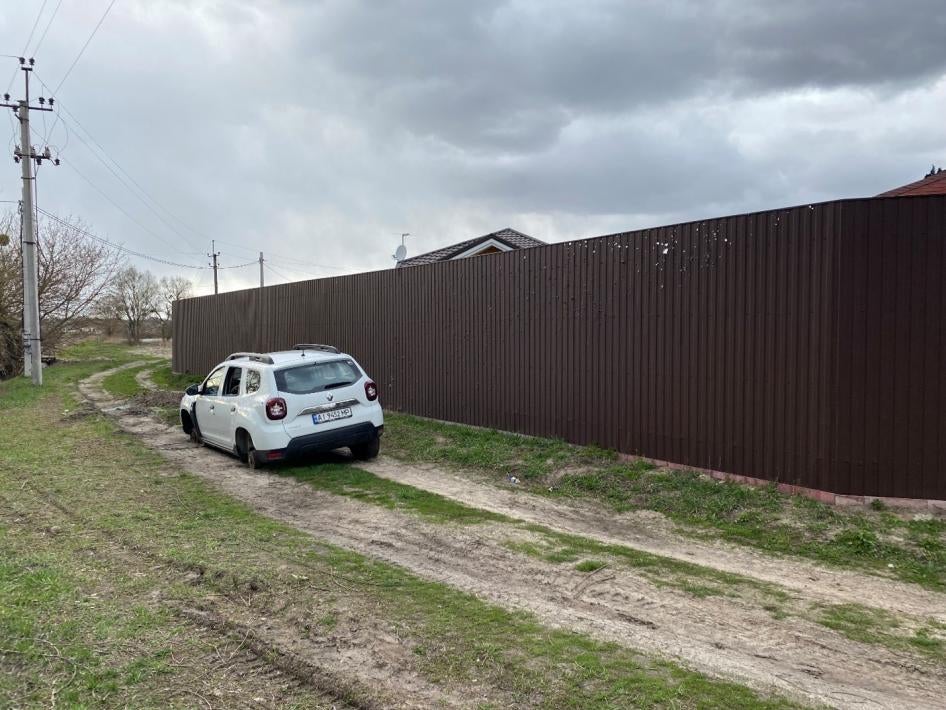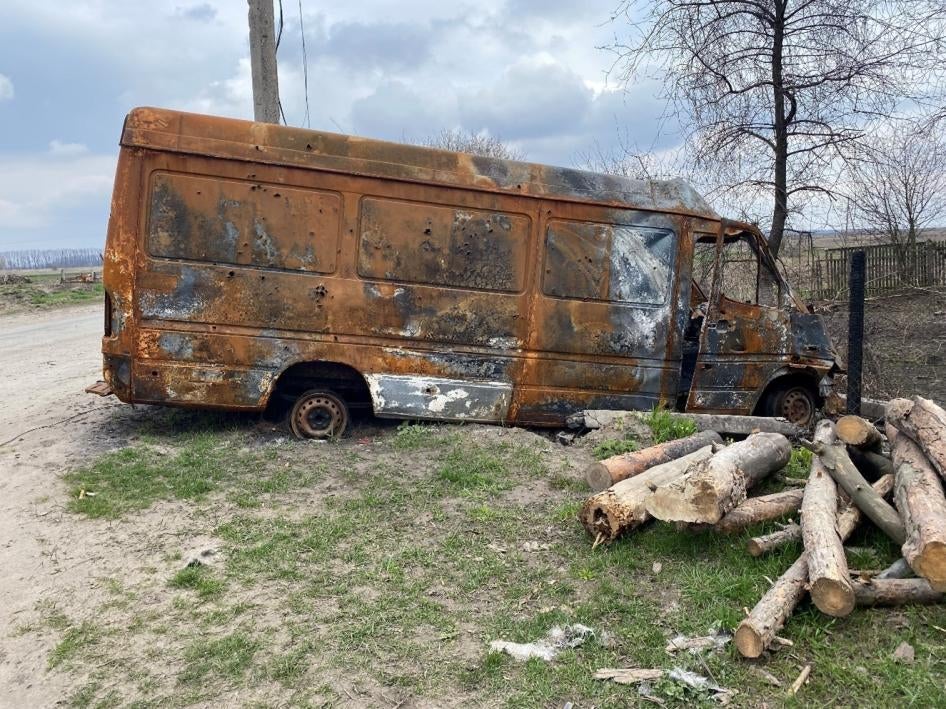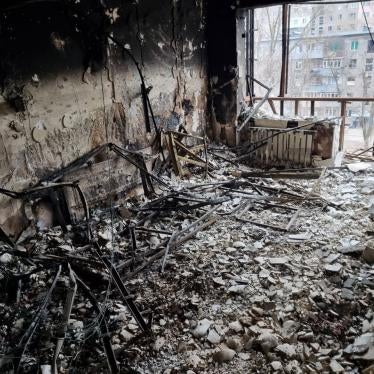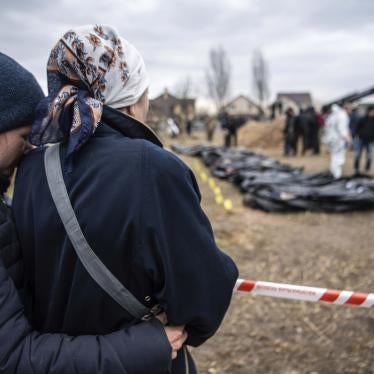(Kyiv) – Russian forces have fired on civilian vehicles in three separate incidents in Ukraine’s Kyiv and Chernihiv regions, killing six civilians and wounding three, Human Rights Watch said today. In one case, they pulled a man from a van and summarily executed him.
“Russian soldiers at checkpoints opened fire on passing vehicles without any apparent effort to verify whether the occupants were civilians,” said Belkis Wille, senior crisis and conflict researcher at Human Rights Watch. “The obligation to distinguish between civilians and combatants is a constant as is the prohibition on targeting civilians, whether in their homes, on the streets, or in their cars.”
Human Rights Watch interviewed nine witnesses who were each present during one of the three incidents, including two who were wounded in these attacks. Researchers visited the sites of the three incidents and examined the four cars that were fired upon. Witnesses say that there were no Ukrainian forces in the vicinity at the time.
The large number of civilian vehicles currently disabled on roads in the Kyiv and Chernihiv regions with bullet holes, burn marks, and other signs of destruction suggests that Russian forces have also harmed other civilians in similar unlawful attacks. Russian forces should respect civilians trying to flee hostilities and facilitate the delivery of impartial humanitarian aid for civilians through territory under their control.
Two of the incidents took place in Hostomel, a town about 20 kilometers northwest of Kyiv. Russian forces tried to secure the area on the first day of their invasion on February 24, 2022, and to seize control of the town’s military airport. Russian forces then occupied the area for much of March, before pulling out of the Kyiv region on March 31.
On February 28, Russian forces opened fire on two vehicles carrying nine civilians who were trying to flee the area. On March 3, they shot at a vehicle with four men who were going to negotiate delivery of humanitarian aid. The third incident took place in the village of Nova Basan, in Chernihiv region, 70 kilometers east of central Kyiv, when Russian forces shot at a civilian van carrying two men, injuring one of them. Soldiers pulled the second man from the van and summarily executed him, while the injured man escaped.
Under international humanitarian law, or the laws of war, civilians may never be the deliberate target of attacks. Parties to an armed conflict must take all feasible precautions to minimize harm to civilians and civilian objects, and not carry out attacks that fail to discriminate between combatants and civilians. Anyone who orders or deliberately commits such acts, or aids and abets them, is responsible for war crimes. Commanders of forces who knew or had reason to know about such crimes but did not attempt to stop them or punish those responsible are criminally liable for war crimes as a matter of command responsibility.
Russia should conduct impartial, thorough, and transparent investigations into these killings and should compensate victims of any unlawful attacks.
“These incidents are indicative of Russian forces’ failure to abide by their obligations to always distinguish civilians and to minimize harm to them,” Wille said. “The Russian military has an obligation to investigate these incidents, hold those responsible to account, and ensure these kinds of killings cease.”
For details about the three incidents, please see below.
Three Killings in Hostomel, February 28
Maksym Maksymenko told Human Rights Watch that at least four Russian armored vehicles were parked meters from his home in Hostomel on February 28. He and his neighbor’s family, who share the same surname but are not related, decided to flee south in the direction of Kyiv. That afternoon, Maksymenko left in his car with four passengers: his mother, Liubov, in the passenger seat, and his wife, Zhanna, their toddler son, and his mother-in-law in the back seat. His neighbor, Oleksandr Maksymenko, with his wife and son, and Maksym’s father, Volodymyr, followed in a second car.
Maksym said that the cars passed through three checkpoints in Hostomel staffed by Russian soldiers without problem. But as the cars approached the fourth, near the southern edge of the city, they were suddenly fired upon from multiple directions. His mother was immediately hit in the head, with “only a piece of the back of her skull remaining and one ear.” He said he stopped the car and tried to duck under the dashboard, but a bullet hit him in the right side of his neck and lodged in his right shoulder blade. The doctor who later removed the bullet at the hospital said it was a 5.45 mm caliber. Maksym Maksymenko lost an eye in the attack and has metal fragments in his head.
A bullet also passed through his wife’s left leg. He said he got out of the car yelling, “Don’t shoot! There are only women and a child in the car!” His son was screaming and covered in blood. Maksym said he was terrified that his son was also injured, but he was covered in his grandmother’s blood.
Maksym said he helped his wife, son, and mother-in-law run to the yard of a nearby house, and then went back and got his father out of the second car, which was also hit, and brought him to the yard. His father died 30 minutes later in his arms with multiple bullet wounds in his abdomen and head, Maksym said.
Oleksandr Maksymenko’s son, Andrii, in the second car, was also fatally wounded. He was shot in the left eye, ear, and shoulder, Maksym said. His father initially buried his body in a temporary grave, but it was exhumed after Russian forces left the area. An autopsy recorded a bullet found in Andrii’s chest, in addition to head wounds.
Human Rights Watch spoke with two members of a family living in the house next to the fourth Russian checkpoint, Valerii Savchenko and Oleksandr Savchenko. They said that, at the time of the shooting, four Russian armored vehicles were parked on the road outside of their home with at least ten Russian soldiers. They did not see but heard the shooting and helped the survivors shelter in their basement, which could be reached from the yard.
Russian forces would not allow the families to evacuate toward Kyiv until at least March 10. Until then, Maksym, his wife, and son remained in the basement without any treatment for their wounds. Maksym said that Russian forces came to the yard several times, spoke to them, saw they were wounded, but offered no medical care.
The Russian forces did not allow Maksym’s family to get his mother’s body out of the car until March 6. The family buried her and Volodymyr in the yard of the home where they sought refuge, and Oleksandr took Andrii’s body by wheelbarrow to bury him in the town’s Kimerka neighborhood, where they had lived.
Human Rights Watch examined the two cars, one green Lada 2101 and one blue Mitsubishi Lancer X, which had been attacked, and saw that both were perforated with a large number of bullet holes of various sizes, and had blood traces on the ceiling of the passenger’s seat of the car where Liubov died.
Two Killings in Hostomel, March 3
Yurii Shturma, 57, a Hostomel entrepreneur, and Taras, 44, the bodyguard for Yurii Prylypko, who withheld his last name, Hostomel’s mayor, said that they, the mayor, and another friend, Ivan Zaria, were driving through Hostomel on the afternoon of March 3, to meet an aid convoy coming from Kyiv. They intended to negotiate with Russian forces to allow the convoy access to the town.
As they turned a corner, they found themselves in front of a column of Russian armored vehicles. Soldiers in the vehicles suddenly opened fire on them with what Taras described as machine-gun fire, and hit Zaria, who was sitting in the back seat, near his left temple. Shturma, who was sitting next to him, tried to stem the flow of blood with a glove, as Taras, the driver, swerved down another road. He soon had to stop because the road was blocked by an abandoned construction digger.
The mayor, Prylypko, got out of the car, Shturma and Taras said, and started running, but a Russian soldier firing from a nearby apartment building gunned him down. Shturma and Taras then got out of the car and hid behind the digger, trying to drag Zaria with them. Zaria was hit a second time and died, they both said. As they sought cover behind the digger, a Russian soldier in the doorway of another nearby apartment building about 100 meters away fired a shoulder-fired rocket at them but missed.
Several hours later, the two men saw three Ukrainian territorial defense force members try unsuccessfully to rescue the body of the mayor, but Russian forces shot at them, wounding one, Karpenko Oleksandr, who later died of his injuries.
With the digger providing Shturma and Taras cover, they dug a small trench with their bare hands and a knife, which took them 12 hours. They then crawled under a fence that ran along the road they were on and hid in the yard of a house for another day. They were eventually able to sneak out of the area, without the Russian sniper seeing them.
Researchers followed the car’s path and saw over 20 bullet holes in the fences behind where Zaria and the mayor were shot, saw the car they had been in, which was still on the street, and the trench and hole under the fence that they had dug. Human Rights Watch also reviewed a CCTV screenshot from a camera in the area showing the digger blocking the car at 4:30 p.m. on March 3. Human Rights Watch identified three perforations in the body of the vehicle on the rear driver side, near where Zaria was sitting. The size and shape of the holes were consistent with projectiles fired from a heavy machine gun.
A Killing in Nova Basan, March 12
Oleksandr, who withheld his last name, is the former father-in-law of Ihor Yakob, a 22-year-old welder, and lives in the northern outskirts of Nova Basan, a village in the Chernihiv region, 70 kilometers east of central Kyiv. Russian forces took control of the village on February 28 and stationed two armored vehicles on either side of the road entering the village next to the former father-in-law’s house. Oleksandr, the former father-in-law, said that at about 8 p.m. on March 12, he heard gunshots and looked out his window. He saw Russian forces firing on a van, which swerved and stopped. He then saw Ihor jump out of the passenger seat and run down a side street. Ihor’s friend Andrii, 30, a delivery driver, stayed in the car.
Interviewed separately, Ihor said that, as they drove past the Russian forces, soldiers opened fire on the van, shooting the tires and forcing them to stop. He said he was injured with a bullet to his left shoulder but was able to jump out of the car and run away. Later, when he received medical treatment, the bullet was found lodged near his spine. He has suffered nerve damage in his left hand and cannot move his fingers.
Oleksandr said that the van broke into flames. He saw soldiers drag Andrii from the driver’s seat and shout at him, “What is your military position?” and “Where are you stationed?” After a moment of silence, he heard one of them say, “He is drunk,” and then he heard them shoot Andrii multiple times.
Oleksandr said his neighbor later came and took Andrii’s body and buried it in his yard. Two other neighbors described the same events to Human Rights Watch. Researchers examined the burned-out van.
Neither Andrii, who was killed, nor Ihor, who was wounded, had any relation to the military, Ihor and Oleksandr said. On the day of the event, they were dressed in civilian clothes and were in a white civilian van.
